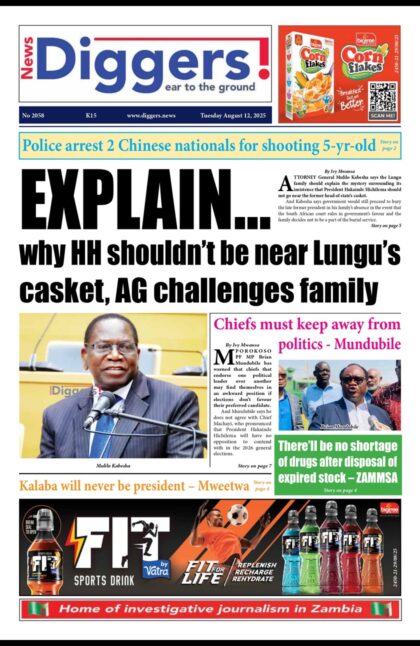FORMER commerce minister Bob Sichinga says Zambia will be sued, blacklisted from borrowing and have its assets seized as a consequence of defaulting on its Eurobond interest repayments.
Zambia became the first African country to default on its Eurobond after it missed an overdue coupon payment of US $42.5 million last Friday.
The country was seeking a six-month deferral on payments until April next year, but failed to get approval from bondholders who rejected the Zambian government’s debt moratorium.
Commenting on the development, Sichinga said he was delighted that the bondholders refused to grant Zambia the much-needed relief, but cautioned that the country was now likely to have its assets seized and blacklisted from further borrowing.
“They did well by not granting the government some relief. I’m glad they didn’t give them, why would you want to give someone who has no plan on what to do next? They did well and I’m happy. The consequences are that the bondholders can choose to enforce that indebtedness through international settlement arrangements. With our debt, they might not even sue us, they might just sell it. They will say, ‘this is just junk!’ They will write it off. They don’t think that we are going to pay. However, because they think we are not going to pay, they will sue us to go to international settlements so that they will now have to sell our assets for them to get back their money,” Sichinga said in an interview.
“If they are too busy, they may choose to discount the debt and sell the debt to what are called ‘vulture funds.’ A vulture fund is where they bury junk securities like ours has become. This is where when a rating agency says Zambia’s debt is DDD, in other words the quality is so bad, it’s junk, it will just be written off. The bondholders are likely to go to the vulture fund managers and sell this junk at a percentage less than the original. The vulture managers will then make Zambia pay the entire debt, plus all the interest. They will come and tell us to settle or else we will sell your assets. They will obtain an order from the international settlements court to confiscate your assets. They can also attach to your proceeds of copper.”
He said the situation called for urgent measures as the trickle-down effect on Zambia’s economy would be severe.
“They are likely to do that. And when you get to that situation, then you get blacklisted. It means we will not get any more loans; we are closer to this situation. We will get blacklisted. This is a very serious matter. Foreign currency, because you are blacklisted, will become scarce. So, what happens is that the exchange rate goes up; when it goes up, what happens to the kwacha, it depreciates, meaning even servicing of loans goes up. Where you were paying K100 million you, you need more. We are expecting the kwacha to hit K30 against a dollar,” he said.
“This means what you were buying or importing have now doubled in price. The truth of the matter is that we are better off dealing with this matter with the urgency it needs rather than burying our heads in the sand like government is doing right now and pretending that this is not a huge matter. There is a serious problem. Soon, we will be unable to get tickets and travel.”
He said it was unfair that those mainly paying the price for the default did not benefit from the loans.
“There is a huge generation that has never experienced what it is when an economy is in dire stress like it was in 1987 to 1990. I’m urging President Edgar Lungu and his government not to take us to that situation. I’m warning this government not to take us back there. When you don’t have a settlement plan, that’s a danger you are exposing this country to. Even if the creditors don’t come for our assets, we are not going to be able to have dollars,” Sichinga cautioned.
“I’m issuing a caution and when the President issues statements like the one he issued when he was commissioning the fly-over bridge, where he said: ‘tupuba tuletalika’, it’s an unwise statement. It’s imprudent. All of us will pay for this debt, not just him, but the entire country. Is it fair that we will be paying the price for the corruption, imprudent and mismanagement of resources and debts? And when we say the economy has collapsed, we don’t mean it will happen at once, no! It’s issues like these that tell you that an economy has collapsed.”
And Sichinga, who is also a former agriculture minister in the Sata-led administration, added that government would not be able to contract further debt without clinching an IMF deal.
“Slowly, we are unable to do certain things. Slowly, it will become difficult to import things; slowly it will be impossible to travel; slowly, it will be difficult to buy clothes and all these other things, that’s an economy collapsing. I can tell you this and let government mark my words: so long as they have no agreement with the IMF, World Bank, they can forget about credit being available to them. They can forget about borrowing again. Nobody will give them credit, none. Not even the Chinese, that is why the Chinese have refused to write-off the debt. They want you to pay. They have said, ‘yes, we can delay it for six months, but after that you have to pay!’ ”
























